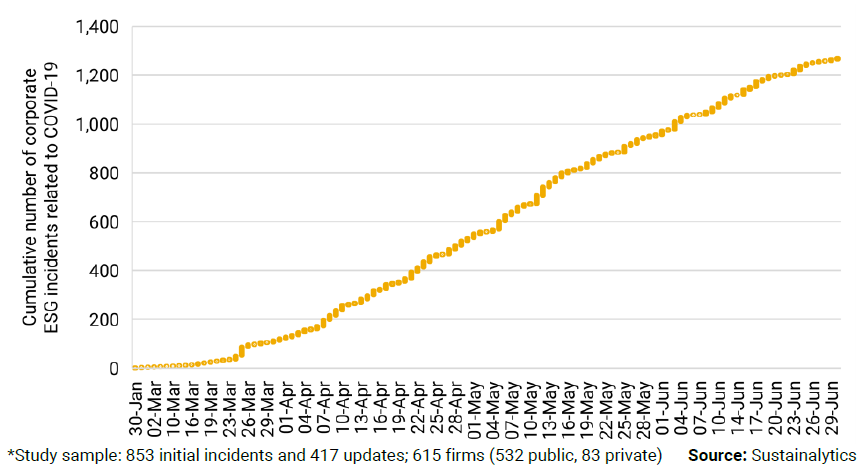Ruth Saldanha: We recently launched our overview of the second quarter of the 2020 sustainable investing landscape for Canadian fund investors. In general, our research indicates that investors who choose sustainable funds do not underperform those that do not have the stated aim of ESG or sustainable governance investing. Ian Tam, Morningstar's Director of Investment Research, is here today to discuss the findings of the report.
Ian, thank you so much for being here today.
Ian Tam: Thanks for having me, Ruth.
Saldanha: Let's start by talking about performance. How have sustainable funds performed relative to their peers so far this year?
Tam: Morningstar ranked 88 sustainable investments over the first half of 2020, and we found that 63 of them, so the broad majority of them, actually outperformed their peers. Moreover, 35 of them placed in the top quartile of their respective peer groups over the first half of the year. So, definitely, very impressive results. It's important to remember though that six months of performance is not nearly enough time to determine the long-term success rates of these types of investments. Our research does show that if you choose to invest sustainably or to use ESG approaches in your investment style, it doesn't necessarily detriment your overall performance in the long run and certainly, the first half of the year has empirically shown us that.
Saldanha: Are investors buying into this seemingly superior performance, meaning, have the sustainable funds seen significant inflows?
Tam: So, Morningstar estimates that the size of the sustainable fund market in Canada is about $8.8 billion at the end of last quarter. And that's still very small compared to the overall total amount of assets invested. But even so, that $8.8 billion is a 13% increase over Q4 2019. So, certainly, an improvement. So, that tells us that there has been some demand for these types of investments. Net flows have been positive in both first and second quarters of 2020.
Saldanha: The report also finds that there are new launches. What is driving the momentum and interest in these sustainable funds, especially the new launches?
Tam: So, I think that there's various investor surveys that have told us that if given the option retail investors will certainly consider investing sustainably. We can also take some hints from the institutional market in Canada. So, many of the largest pension funds in Canada have required that their third-party managers have some sort of an ESG consideration in their investment process before being considered as a third-party manager. So, certainly, there is some demand. And fund manufacturers are no strangers to meeting demands. So, certainly, we've seen 15 new fund launches that have sustainable investment processes in the first half of the year and 4 of those were from the second quarter of the year. Certainly, fund manufacturers are…
Saldanha: The report also shows that there have been a slew of new fund launches. What is driving the momentum and interest in sustainable funds, especially of these new launches?
Tam: So, I think that various investor surveys have shown that there certainly is interest from the retail market in investing sustainably. We can also take some hints from the institutional market. For example, many of Canada's largest pension funds actually require that their third-party managers consider ESG risk in their investment process before being considered on the platform. So, both from the retail market and from the institutional market, you can see there's certainly demand. And of course, fund manufacturers are no strangers to meeting demand. Year-to-date, we've seen 15 new fund launches, 4 of which were launched in Q2 of this year, all of which used sustainable investment processes as defined in their prospectus documents.
Saldanha: Do these new launches favour an approach of exclusion or more of engagement?
Tam: So, exclusion and engagement are not mutually exclusive. The way that Morningstar analyzes fund prospectuses is to seek out the various approaches that are used. For example, a fund can both seek to reduce exposure to ESG risk and at the same time also engage with the company to ensure that the management has the right strategy to reduce ESG risk. So, again, they are not mutually exclusive. That said, we've found that there are only 37 funds in Canada that explicitly say that they use a shareholder engagement approach to investments whereas there are about 97 funds in Canada that use what we call ESG incorporation which is essentially seeking to reduce exposure to ESG risk.
Saldanha: Finally, what are the findings in terms of what these 96, 97 funds exclude?
Tam: Yeah. So, sustainable investments don't necessarily require or not require exclusions in particular sectors. You can have funds that exclude a particular controversial area and not be deemed sustainable and vice versa. So, we found that there are about 150 funds in Canada that mention some form of exclusion in a particular controversial area. Now, the broad majority of them, about 100 of these funds, tend to exclude areas like controversial weapons and tobacco. What's surprising is that there are no funds that exclude explicitly areas like animal testing as well as pesticides in Canada, so certainly, an area that's lacking, at least in terms of explicitly mentioning exclusions in the fund prospectus document.
Saldanha: Thank you so much for joining us today with the findings of this report.
Tam: Thanks, Ruth.
Saldanha: For Morningstar, I'm Ruth Saldanha.
The rules of responsible investing
Understand how ESG regulations affect investors and managers in our latest report








.jpg)











